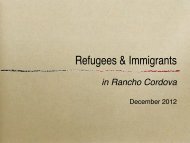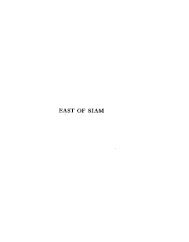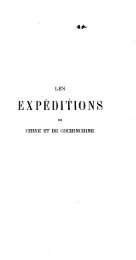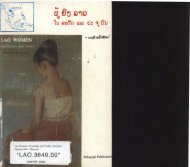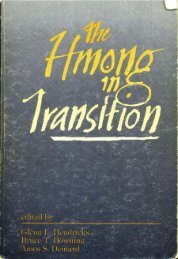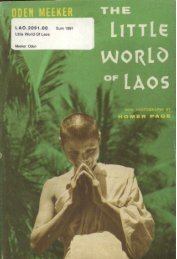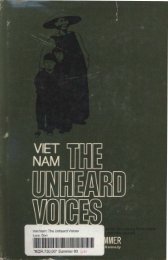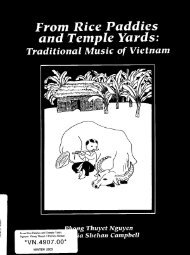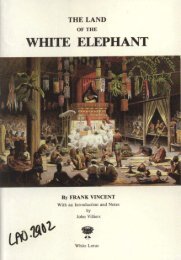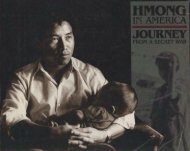PEOPLE
Grant, The Boat People - Refugee Educators' Network
Grant, The Boat People - Refugee Educators' Network
- No tags were found...
Create successful ePaper yourself
Turn your PDF publications into a flip-book with our unique Google optimized e-Paper software.
The Boat hop18<br />
I<br />
there in her ornate antebellum southern mansion and king told rhat her<br />
estate was in chaos and the old life m r and saying 'I don't want to think<br />
abut thit todey, I'll think about that tomorrow'? Well, that's how it was then,<br />
in the state department and the Pentagon.<br />
As late as Scpttmkr 1979, senior officials in Washington were<br />
prepared to concede, at least privately, that the administration's strategic<br />
thinking about Viemam's future role in South-East Asia, and<br />
its consquenccs for both the United States and the region as a<br />
whole, was still, in the words of one of them, 'relatively elementary'.<br />
Long-term policy remained hostage to Ameria's uncertainty about<br />
how long Vietnam intended to maintain its forces in Kampuchea,<br />
whether chi^ was planning to teach Vietnam another lesson, and<br />
the new instability of great-powcr rclations in the region since Vietnam's<br />
friendship treaty with the Soviet Union and China's invasion<br />
of Vietnam. The immediate issue was the question of 'normalization':<br />
whether$ and when, the United Statcs should recognize the<br />
Socialist Republic of Vietnam, exchange diplomatic reprcscntatives<br />
with it, and lift its ude tmbsrgo. On that issue, American policy<br />
was frozen. On four wpatate occasions during June and July 1979,<br />
senior officials of the Caner administration had wld Vitmarntse<br />
represm~tives in New York and Geneva that the United States was<br />
not prepared to resume negotiations for normalization in the prevail-,<br />
ing cirmmstanccr.<br />
Soon after taking office in January 1977, President C~rrer dcclared<br />
his intention to move, if possible, to normal diplomatic<br />
rclations with Vietnam, By October 1978 Washington and Hanoi<br />
sccmd halfway to an agreement. The United States, with wme reservations,<br />
seemed satisfied that Hanoi would provide a full account<br />
of the fate of American servicemen still Listed as missing in action<br />
in the Vietnam war, and help recover their remains, The Carter<br />
administration had abandoned its inherited opposition to Vietnam's<br />
admission to the United Nations; Hanoi no longer claimed that the<br />
Unitcd States was bound by the Paris accords of 1973 to provide<br />
economic assistance as a precondition to resuming normal relations.<br />
But in November 1978 the United States had tnkm the initiative and<br />
suspended negotiations in cimmstances that fed each side's suspicion<br />
of the other and hardened public and congressional opinion<br />
in America. The official explanation blamed the breakdown on<br />
I<br />
Viemam's rccalcitranw: i$ dctmnination to invade Kampuchea, the<br />
dramatic incrwse in the flow of IndoChinae refugees, and Vietnam's<br />
new and disturbing relationship with the Soviet Union. All<br />
this, Richard Holbrmlre, assistant secretary for East Asia and the<br />
Pachie, told the House of Represcntariv~ subcommittee on Asian<br />
and Pacific alTain on 13 June 1979, had compcllad the Unittd States<br />
to draw hack,<br />
Early id the negotiations, Mr Holbrooke wid, the US had told<br />
Vie- that normalizatim dtpended on Vicm's willingncr~s 'to<br />
follow policies supprtive of pce ~nd stability in the region', Even<br />
before Viemam's invasion of Kampuchea, the US had warned Hanoi<br />
that the Pol Pot dgime's 'unpmllcled aimes' would not justify a<br />
Vicmmesc violation of Kampuchea's sovereignity. Hanoi had<br />
claimed its military build-up on the Kampuchcan border wars 'purely<br />
defensive' and had given assuranecs that it had 'no aggressive plans<br />
towards that country' - but it had still gone ahead and invaded Kampuchea,<br />
l3e US had also asked for assurances that Viemnm would follow<br />
an 'independent' foreign policy. It had been told thet the beaty with<br />
the Soviet Union was 'not directed at any third nation', But Soviet<br />
destroyers, submarines and TU-95 long-range reconnaissance aircraft<br />
were now using Viemam's port and base facilities in Da Nang<br />
and Cam Rdn Bay, and that was 'a source of serious concern to us<br />
and to most Asian countries, not only milimrily, but bccaursc of the<br />
dangem to the region of increased great-power rivalry and the consequent<br />
risk of haeasing tensions'.<br />
Also, the US had concludcd that Vietnam had 'embarked on a<br />
delibente effort to rid itself of those elements of society it considers<br />
undesirable', Arnuicans did not wish ,m see Vietn~m force an end<br />
to emigration, but the growing refugee exodus had caused unacecptable<br />
human suffering and 'massive burdens' on rhe other Sourh-East<br />
Asian countries. Hanoi had simply claimed it was 'powcrlcss to coneol<br />
the flight of malcontents who were not willing to work to build<br />
a new Vietnam'.<br />
The counter-theory, promotcd by the critics of the Carter administration's<br />
Vietnam policy (and by Hanoi itself), is that the US deliberately<br />
stalled the negotiations with Hanoi even before Vietnam<br />
invadcd Kampuchea or the flow of refugees reached intolemble





